Islam is a way of life rooted in divine guidance, emphasizing the Five Pillars as foundational practices․ It nurtures spiritual growth, community, and a purposeful daily existence․
1․1․ What Islam Means and Its Global Significance
Islam, meaning “submission to Allah,” is a faith emphasizing peace, mercy, and spiritual growth․ With over 1․9 billion followers, it is a global religion shaping cultures worldwide․ Its teachings promote unity, justice, and compassion, resonating across diverse societies․ Islam’s universal message addresses human needs, fostering a balanced life and pursuit of eternal blessings, making it a cornerstone of inspiration for millions․ Its influence extends beyond spirituality, impacting art, science, and social systems historically․ As a practical guide, Islam offers a comprehensive way of life, connecting individuals and communities in shared values and practices․
1․2․ The Five Pillars of Islam: A Foundation of Faith
The Five Pillars form the essence of Islamic practice, guiding Muslims in their devotion and daily life․ Shahada, the declaration of faith, affirms belief in Allah and Prophet Muhammad․ Salah, the five daily prayers, fosters spiritual discipline and mindfulness․ Zakat, or charity, cultivates compassion and social responsibility․ Sawm, fasting during Ramadan, promotes self-reflection and empathy․ Hajj, the pilgrimage to Mecca, symbolizes unity and spiritual renewal․ Together, these pillars create a structured path for living a righteous, balanced, and purposeful life, reflecting Islam’s holistic approach to faith and practice․ They serve as both individual and communal acts, strengthening the connection between believers and their faith․
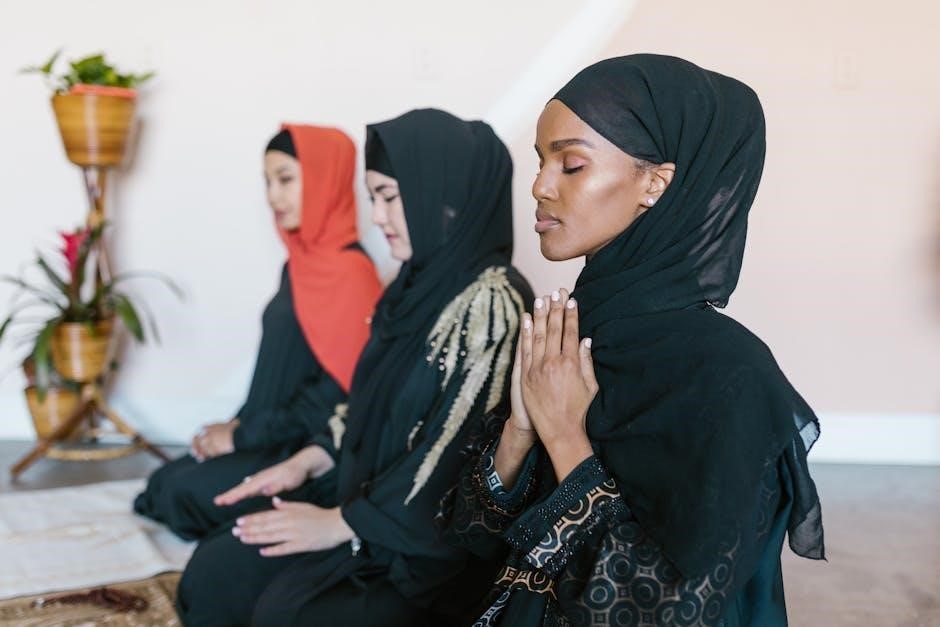
Shahada (Declaration of Faith)
Shahada, the first pillar of Islam, is the declaration of faith, affirming belief in Allah and Prophet Muhammad․ It represents acceptance and commitment to Islamic teachings, recited daily to reaffirm devotion and unity among Muslims․
2․1․ The Significance of the Shahada in Islam
The Shahada, or declaration of faith, holds profound significance as the foundation of Islam․ It is the first pillar and the gateway to becoming a Muslim․ Reciting the Shahada, “La ilaha illallah, Muhammadur Rasulullah” (There is no god but Allah, and Muhammad is the Messenger of Allah), publicly declares one’s belief and commitment to the faith․ This declaration is not just a verbal statement but a deeply personal affirmation that shapes a Muslim’s identity and worldview․ It serves as a constant reminder of divine sovereignty and prophetic guidance, influencing daily actions and decisions․ The Shahada is also recited in daily prayers, reinforcing faith and unity among believers․ Its simplicity belies its power to transform lives and foster a sense of belonging to the global Muslim community․
2․2․ How to Recite the Shahada Correctly
Reciting the Shahada correctly involves both proper articulation and sincere intention․ The phrase “La ilaha illallah, Muhammadur Rasulullah” should be pronounced clearly in Arabic, with attention to correct pronunciation․ It is essential to understand its meaning: “There is no god but Allah, and Muhammad is the Messenger of Allah․” Recitation should be done with conviction, reflecting belief in Allah’s oneness and Muhammad’s prophethood․ The Shahada is ideally recited publicly, often in the presence of witnesses, when converting to Islam․ Proper etiquette includes purity of heart, cleanliness of body, and a calm, respectful demeanor․ Regular recitation strengthens faith and serves as a reminder of one’s commitment to Islam․
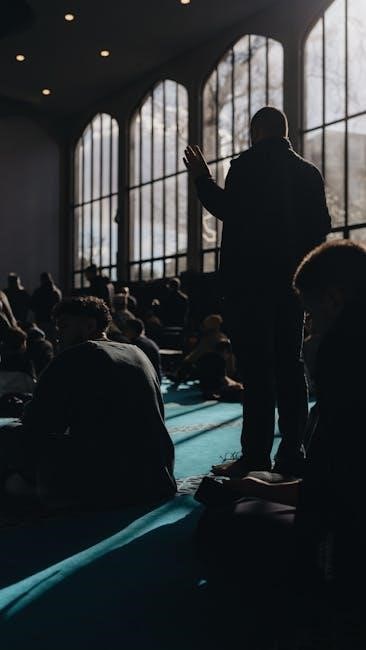
Salah (Daily Prayer)
Salah is the second pillar of Islam, involving five daily prayers at specific times․ It requires facing the Kaaba, performing ritual ablutions, and following a structured sequence of standing, bowing, and prostration․ This practice fosters a direct connection with Allah, promotes self-discipline, and brings inner peace, guiding believers in their daily lives and spiritual journey․
3․1․ The Five Daily Prayers: Their Timing and Importance
The five daily prayers in Islam are performed at specific times: Fajr (dawn), Dhuhr (noon), Asr (afternoon), Maghrib (sunset), and Isha (night)․ These timings are rooted in Islamic tradition and are designed to punctuate the day with moments of worship․ Fajr, the first prayer, marks the beginning of the day, while Isha, the last, concludes it․ Each prayer time carries unique spiritual significance, fostering a rhythm of mindfulness and gratitude․ Observing these prayers strengthens one’s connection to Allah, promotes discipline, and provides a sense of balance in daily life․ Regularity in prayer is highly encouraged, as it reflects a Muslim’s commitment to their faith and spiritual growth․
3․2․ Performing Salah: A Step-by-Step Guide
Performing Salah begins with making the intention to pray․ Stand facing the Kaaba, ensuring purity of body and clothes․ Start with takbirat al-Ihram (saying “Allahu Akbar”), raising your hands to your ears․ Recite the Quran, beginning with Surah Al-Fatihah, followed by another surah or verses․ Perform ruku (bowing), keeping your back straight, and say, “Subhana Rabbiyal-Azim․” Move into sujud (prostration), placing your forehead, nose, and hands on the ground, and glorify Allah․ Sit between the two prostrations, then repeat the prostration․ Conclude with tasleem (saying “As-salamu Alaikum” to end the prayer)․ Regularity and sincerity in Salah strengthen spiritual connection and discipline․
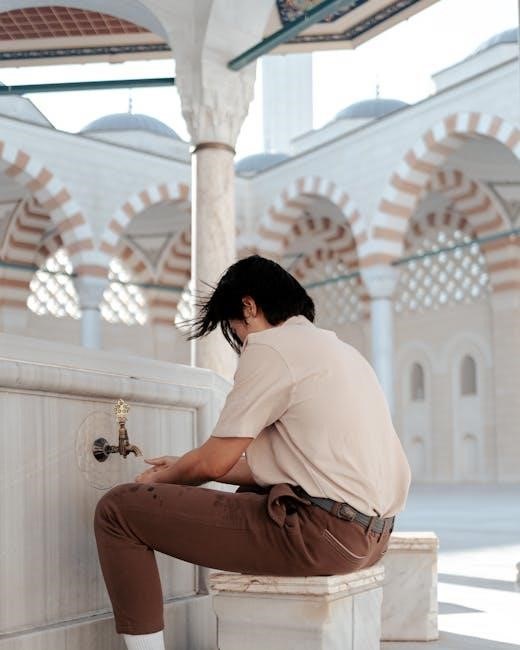
Zakat (Charity)
Zakat is a mandatory act of charity, requiring Muslims to give 2․5% of their excess wealth to those in need, fostering social welfare and equality․
4․1․ Understanding Zakat: Obligation and Calculation
Zakat is an obligatory charity for Muslims, requiring them to give 2․5% of their excess wealth annually to eligible recipients․ It applies to assets like cash, gold, silver, and surplus income exceeding the nishab threshold․ The nishab is equivalent to the value of 87․5 grams of gold or 625 grams of silver․ Individuals must calculate their taxable wealth, excluding essential expenses and debts․ Zakat fosters social equity and spiritual growth, ensuring resources are shared with those in need, such as the poor, needy, and those in debt․ Proper calculation ensures compliance with Islamic principles, promoting fairness and compassion in society․
4․2․ How Zakat Impacts the Muslim Community
Zakat profoundly benefits the Muslim community by fostering economic equality and social justice․ It provides essential support to the poor, needy, and debt-ridden, helping them meet basic needs․ This obligation ensures that wealth circulates within the community, preventing concentration among the rich․ Zakat also funds educational and healthcare initiatives, improving overall quality of life․ It strengthens communal bonds, promoting a sense of responsibility and solidarity․ By fulfilling this duty, Muslims not only uphold a religious obligation but also contribute to the well-being of their community, embodying Islam’s emphasis on compassion and collective welfare․ Zakat’s impact extends beyond individual relief, shaping a more equitable and harmonious society․

Sawm (Fasting During Ramadan)
Sawm is the Islamic practice of fasting from dawn to sunset during Ramadan․ It fosters self-control, empathy, and spiritual connection, enriching both body and soul․
5․1; The Spiritual and Physical Benefits of Fasting
Fasting during Ramadan offers profound spiritual and physical benefits․ Spiritually, it strengthens faith, self-discipline, and empathy for those in need․ Physically, it promotes detoxification, improved digestion, and weight management․ Fasting also enhances mental clarity and emotional resilience, fostering a deeper connection with Allah․ Additionally, it encourages healthier eating habits and a sense of gratitude․ The combination of spiritual reflection and physical restraint creates a holistic transformation, benefiting both the soul and the body․ This practice is a unique opportunity for personal growth and renewal, aligning with Islam’s emphasis on balancing spiritual and physical well-being;
5․2․ Rules and Etiquette for Observing Ramadan
Observing Ramadan requires adherence to specific rules and etiquette․ Fasting begins at dawn (Suhoor) and ends at sunset (Iftar), abstaining from food, drink, and sinful actions․ Intention (Niyyah) for fasting must be made nightly․ Avoiding gossip, arguments, and unnecessary speech is encouraged․ Engaging in Tarawih prayers and Quran recitation is highly recommended․ Breaking the fast with dates and water is traditional, followed by Maghrib prayer․ Acts of charity and kindness are emphasized․ Eating in public and smoking during daylight hours are prohibited․ Maintaining modesty and humility is essential․ These practices foster unity, self-reflection, and devotion, aligning with Ramadan’s spiritual goals․
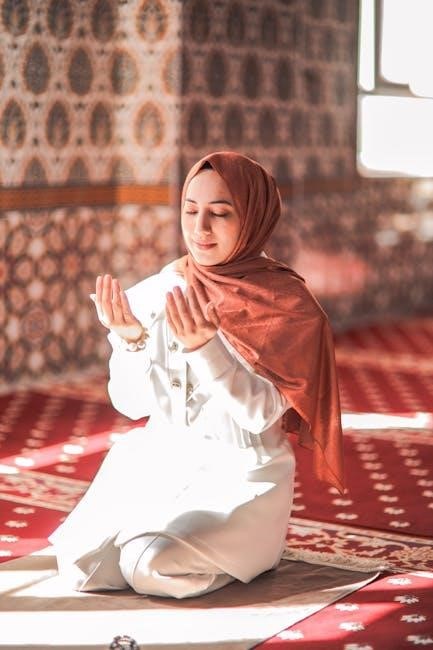
Hajj (Pilgrimage to Mecca)
Hajj is a sacred pilgrimage to Mecca, obligatory for all able Muslims at least once in a lifetime, fostering spiritual renewal and unity among believers globally․
6․1․ The History and Spiritual Significance of Hajj
Hajj, the pilgrimage to Mecca, traces its origins to Prophet Ibrahim (Abraham), who built the Kaaba, Islam’s holiest site․ This sacred journey reflects unity and equality, as millions of Muslims from diverse backgrounds gather annually․ The rituals, such as circling the Kaaba and the symbolic journey to Mount Arafat, embody a spiritual renewal and connection to divine guidance․ Hajj commemorates Ibrahim’s devotion and the sacrifice of his son Ismail, symbolizing unwavering faith․ It is a transformative experience, purifying the soul and reinforcing commitment to Allah․ The pilgrimage strengthens the global Muslim community, fostering a shared identity and spiritual rejuvenation, while fulfilling a fundamental Islamic obligation․
6․2․ Preparing for Hajj: Practical Steps and Requirements
Preparing for Hajj involves both spiritual and logistical steps․ Pilgrims must obtain a valid Hajj visa and ensure all travel documents are in order․ Vaccinations, particularly for meningitis, are often required․ Financial planning is crucial, as costs can be substantial․ Purchasing Ihram clothing, essential for the rituals, is a key step․ Pilgrims should also study the Hajj rituals to understand the procedures․ Spiritual preparation includes increasing acts of worship, seeking forgiveness, and setting sincere intentions․ Health check-ups are recommended, especially for those with medical conditions․ Travel arrangements, including flights and accommodation in Mecca, should be confirmed well in advance to avoid delays․ Proper physical conditioning is also advised due to the demanding nature of the pilgrimage․
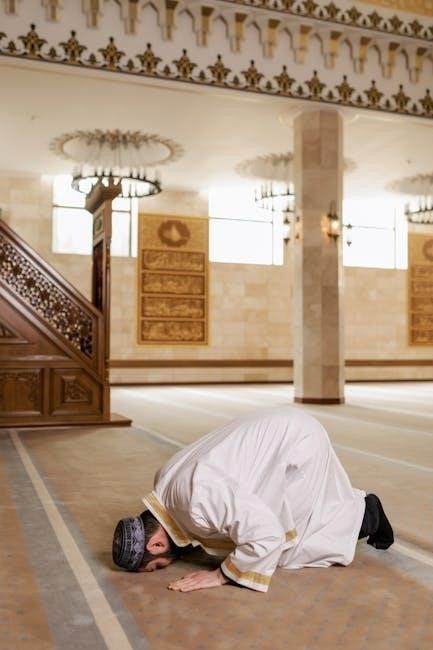
Daily Life as a Muslim
Daily life as a Muslim involves integrating Islamic values into routines, practicing the Five Pillars, and adhering to ethical standards in all interactions and decisions․
7․1․ Incorporating Islamic Values into Everyday Life
Incorporating Islamic values into daily life involves practicing compassion, honesty, and humility․ Muslims are encouraged to reflect these values in their interactions, ensuring fairness and kindness in all dealings․ Gratitude and patience are emphasized, fostering a mindset of contentment and resilience․ These principles guide decisions, from personal relationships to professional conduct, promoting a harmonious and ethical lifestyle․ By integrating these values, Muslims strive to embody the teachings of the Quran and Sunnah, creating a balanced and purposeful existence that honors their faith and benefits society․
7․2․ The Role of the Mosque in Muslim Communities
The mosque is a central hub for Muslim communities, serving as a space for spiritual growth, education, and social interaction․ Beyond hosting the Five Daily Prayers, it organizes events like Friday sermons and Ramadan gatherings, fostering unity and knowledge․ Mosques also act as centers for charity, collecting and distributing Zakat to those in need, and host educational programs for children and adults․ They provide a welcoming environment for believers to connect, learn, and practice their faith collectively, strengthening both individual spirituality and community bonds․ The mosque’s role extends beyond worship, becoming a vital institution for social and religious enrichment․
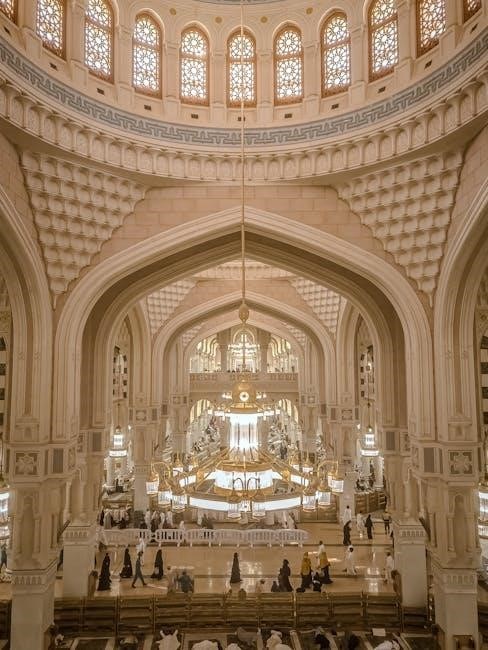
Spiritual Growth and Development
Spiritual growth in Islam is nurtured through the Quran, Sunnah, and optional prayers․ Muslims strengthen their faith by reflecting on divine teachings, fostering humility, and seeking self-improvement․
8․1․ The Importance of the Quran and Sunnah
The Quran and Sunnah are central to Islam, offering divine guidance and moral direction․ The Quran, as the holy book, provides teachings and principles for believers to follow, while the Sunnah, comprising the Prophet Muhammad’s (peace be upon him) sayings, actions, and approvals, serves as a practical example of how to live according to Islamic teachings․ Together, they guide Muslims in worship, ethics, and daily life, ensuring a balanced and righteous existence․ They are indispensable for spiritual growth, shaping a Muslim’s character and helping them fulfill their purpose in life․
8․2․ Engaging in Optional Prayers and Night Prayers
Optional prayers, such as Tarawih during Ramadan and Tahajjud at night, strengthen a Muslim’s spiritual connection․ These prayers are not obligatory but highly recommended․ They provide opportunities for reflection, seeking forgiveness, and building intimacy with Allah․ Tarawih, performed in congregation, fosters unity and enhances the recitation of the Quran․ Tahajjud, offered in the late or early morning, is a time for personal supplication and self-refinement․ Engaging in these prayers consistently can elevate one’s faith, bring peace, and cultivate discipline․ They are powerful means to seek Allah’s mercy and guidance, complementing the obligatory prayers and enriching one’s spiritual journey․
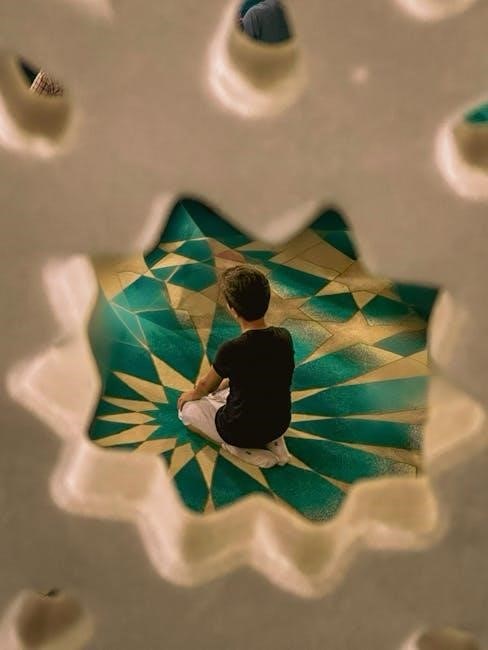
Social Responsibility in Islam
Islam emphasizes social responsibility, encouraging justice, compassion, and community service․ Muslims are taught to care for others, following Quranic and Sunnah guidance for societal harmony․
9․1․ The Concept of Jihad: Understanding Its True Meaning
Jihad is often misunderstood, but its core meaning in Islam is “struggle” or “striving․” It encompasses both the internal spiritual battle against sin and external efforts to uphold justice․ While it can involve physical struggle in self-defense or defense of faith, this is subject to strict ethical guidelines․ The greater jihad refers to the personal, daily struggle to live righteously, while the lesser jihad involves physical conflict․ Muslims are encouraged to engage in jihad with their wealth, knowledge, and actions to benefit society, reflecting Islam’s emphasis on ethical conduct and societal welfare․ Understanding jihad requires exploring its diverse interpretations and contexts within Islamic teachings, avoiding oversimplification;
9․2․ Serving the Community: Charity and Volunteering
Serving the community is a vital aspect of Islam, rooted in the values of compassion, justice, and collective responsibility․ Muslims are encouraged to engage in acts of charity and volunteering as a means of worship and societal benefit․ Charity, or sadaqah, extends beyond financial support to include kindness, advice, and time․ Volunteering fosters a sense of community and mutual support, reflecting Islam’s emphasis on social welfare․ Prophet Muhammad (peace be upon him) often emphasized the importance of helping others, stating that a person’s faith is incomplete without caring for others․ By actively contributing to their communities, Muslims embody the teachings of Islam, fostering a more just and harmonious society while seeking divine favor․
Cultural and Historical Context
Islam originated in Arabia, spreading globally through trade and conquests․ Key historical figures like Prophet Muhammad and his companions shaped its trajectory, influencing culture and science․
10․1․ The Origin of Islam and Its Spread
Islam emerged in the 7th century CE in the Arabian Peninsula, beginning with Prophet Muhammad’s revelations in Mecca․ The Quran and Sunnah formed its core teachings․ After facing persecution, Muslims migrated to Medina, establishing the first Islamic community․ Through trade, conquests, and missionary work, Islam spread rapidly across the Middle East, North Africa, and beyond․ This expansion introduced Islamic values, art, and science, enriching diverse cultures while preserving its monotheistic essence․ The spread of Islam shaped global history, creating a vibrant, interconnected Muslim world that continues to grow and influence societies today․
10․2․ Key Historical Figures in Islam
Prophet Muhammad, the final prophet, is central to Islam, having received the Quranic revelations․ His leadership unified Arabia and established the faith․ The first four caliphs—Abu Bakr, Umar, Uthman, and Ali—played pivotal roles in expanding Islam and upholding its teachings․ Scholars like Imam Bukhari and Ibn Taymiyyah contributed to Islamic jurisprudence and theology․ These figures shaped Islamic law, community, and spirituality, leaving a lasting legacy that guides Muslims today․
Their contributions to Islamic thought and practice remain foundational, influencing daily life, worship, and societal values․ Their examples inspire Muslims to emulate their piety, wisdom, and commitment to faith․
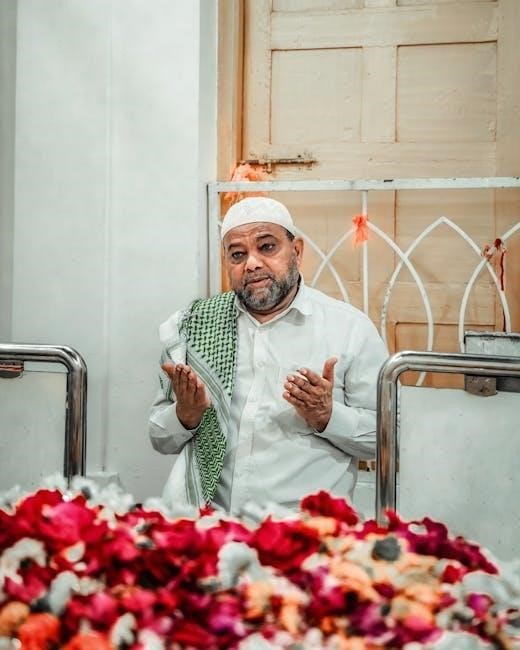
Common Questions and Misconceptions
Islam is often misunderstood, with myths about its teachings․ Clarifying these, Islam emphasizes peace, equality, and compassion, while promoting a balanced and diverse spiritual way of life․
11․1․ FAQs About the Five Pillars of Islam
The Five Pillars of Islam—Shahada, Salah, Zakat, Sawm, and Hajj—form the foundation of Muslim practice․ FAQs often revolve around their meanings and practical application․ Shahada, the declaration of faith, is the first pillar, affirming belief in one God and Prophet Muhammad․ Salah refers to the five daily prayers, which must be performed facing Mecca․ Zakat is charity, typically 2․5% of excess wealth, to support the needy․ Sawm is fasting during Ramadan, fostering self-control and empathy․ Hajj, the pilgrimage to Mecca, is obligatory once in a lifetime if physically and financially capable․ These pillars guide Muslims in worship, ethical living, and community service, embodying Islam’s holistic approach to faith and daily life․
11․2․ Understanding Islam in Modern Society
Islam in modern society is often misunderstood, yet its teachings emphasize peace, justice, and compassion․ Many misconceptions arise from cultural practices being confused with religious teachings․ Education and dialogue are key to fostering understanding․ Muslims today navigate the balance between adhering to Islamic values and integrating into diverse societies․ Technology and media play a significant role in spreading awareness about Islam, dispelling stereotypes, and showcasing its universal principles․ By engaging in open conversations and promoting mutual respect, Muslims and non-Muslims can work together to build inclusive communities․ Islam’s emphasis on equality, justice, and mercy resonates with modern ideals, offering a shared foundation for global harmony․